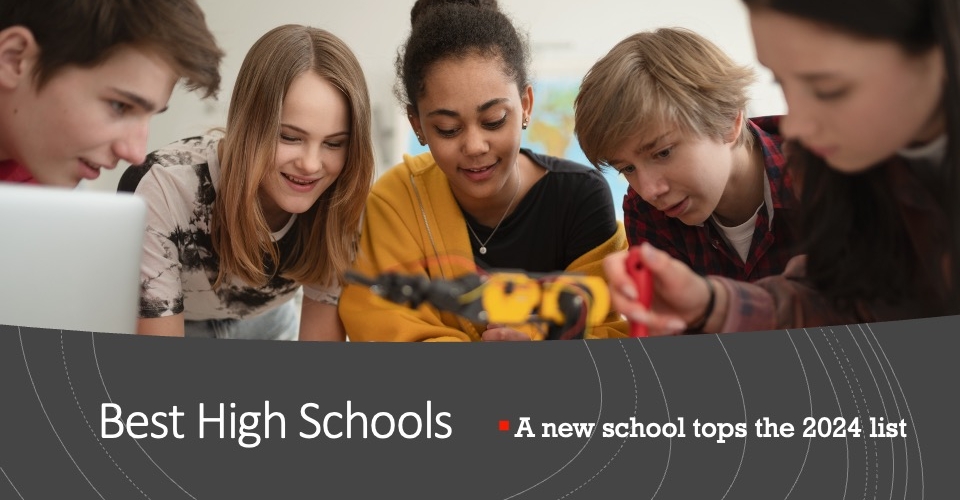Education technology is fundamental for enhancing student learning and engagement. That’s what we hear all the time from K12 technology professionals. And while edtech helps drive academic performance, it shouldn’t be the end-all-be-all, because it can never fully replace the classroom teacher. Some schools, however, are leveraging technology in new and innovative ways with the understanding that educators must stay up to speed with the evolving landscape that is edtech.
Last week, District Administration highlighted a new report from the State Education Technology Directors Association that breaks down the latest edtech trends K12 leaders should have on their radar in 2023 and beyond. Also included in the report are some case studies of states that are leveraging technology in innovative ways for the benefit of their students.
It’s important for leaders to share ideas and the great things they’re doing for their districts. That’s why we’re showcasing these five states featured in the report that are spearheading various initiatives centered around edtech and student achievement. Let’s start with Arizona.
The need to support edtech – Arizona
Between 2004 and 2010, Arizona’s Department of Education utilized an office of educational technology. To no surprise, a state technology task force highly recommended bringing it back during the pandemic.
In its early days, the office’s Director Karina Jones told the researchers of the report that the group “was focused on supporting online learning, which made sense during the pandemic when districts and students were struggling with remote instruction.” Since then, it has evolved as a service agency centered around three key foundations:
- Developing a sense of community across Arizona
- Leveraging data to focus the department’s work while supporting educators
- Providing solutions for educators and administrators based on their feedback
Another focus is to use edtech to create positive academic outcomes. They’ve developed a digital library of “vetted and standards-aligned resources for educators to access at no cost,” the report reads.
Enhancing cybersecurity – Louisiana
“We’re in the electronic age,” Carol Mosley, co-director of the Education Technology program and overseer of the E-Rate program for the Louisiana State Department of Education, said in the report. “If you’re not already thinking about technology and security, you have to.”
Mosley also mentioned that cybersecurity has always been a top priority, even before the technology boom brought forth by the pandemic. As such, her team has taken a hands-on approach to cybersecurity across Louisiana. They work diligently with school IT teams to determine what kinds of security practices would best serve the needs of certain schools throughout the state.
“We went from being reactive to proactive,” she said.
They also conduct full scans of schools’ networks and provide recommendations on how to bolster their security, offer budgeting plans and make sure edtech products meet security standards.
AI is inevitable in K12 education – Illinois
This year, the state’s General Assembly passed legislation enabling the creation of the Generative AI and Natural Language Processing Task Force, which aims to investigate and offer suggestions on policy implementation surrounding artificial intelligence in K12 schools.
More from DA: In downtime alone, ransomware attacks have cost the education sector more than $50 billion since 2018
“We are excited for K12 to be at the table to help inform the state’s approach to generate AI,” Director of Government Affairs at the Learning Technology Center of Illinois Mindy Fiscus said in the report.
Enhancing home access through cross-agency collaboration – New Mexico
As many leaders already know, the pandemic exposed a deep digital divide among student groups throughout the country. As students took part in remote learning, many found it difficult due to their lack of internet access at home.
More than 75,000 students lacked home internet in New Mexico, according to the research. Officials worked across agencies and with internet service providers to find a solution to these issues.
The Public Education Department worked with the Department of Information to create detailed maps that “pinpoint every child in the state who lacks access” to the internet, the report reads.
Officials at New Mexico’s Office of Broadband Access and Expansion also worked with the PED and other local communities to address gaps in these targeted locations across the state, including engaging local telecoms or launching campaigns that promoted various resources and funds available to families.
Promoting equitable and effective use of edtech – Massachusetts
During the pandemic, Massachusetts launched a crisis-response team in order to meet its emergency technology needs. Since then, the Office of Educational Technology has kept a keen focus on strategic and equitable edtech use in K12 schools.
The state has also given leaders resources to put best practices and recommendations in place at their schools. For instance, the office leverages an edtech peer learning cohort “for teams of edtech leaders and educators,” who meet monthly for “coaching, collaboration, troubleshooting and addressing relevant problems of practice,” according to the report.
Finally, Massachusetts issued a grant called Building Capacity for Effective Technology Integration, which supports 17 districts by providing professional learning opportunities centered around utilizing edtech in the classroom.









